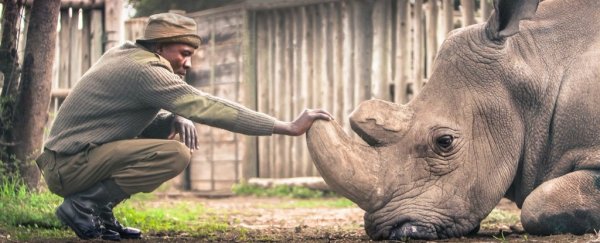An international team of scientists trying to save the northern white rhino from extinction has just announced another significant victory.
Yesterday we reported that 10 eggs had been successfully harvested from the two surviving females Najin and Fatu.
Now, scientists have revealed that of those eggs, seven were successfully matured and artificially inseminated using a technique called ICSI (Intra Cytoplasm Sperm Injection).
After the successful harvest of 10 eggs from the world’s last two northern white rhinos, Najin and Fatu, 7 eggs (4 from Fatu and 3 from Najin) were on August 25th, successfully matured and artificially inseminated with frozen sperm from northern white rhino bulls, Suni and Saut. pic.twitter.com/2xWsb2gvRn
— Ol Pejeta (@OlPejeta) August 26, 2019
The researchers and conservationists will now have to wait to see if the fertilised eggs create viable embryos that can be transferred to a southern white rhino surrogate mother.
For more background and detail, see our earlier story on this ambitious, ongoing effort to save the northern white rhino below:
There are only two of them now: Najin, and her daughter, Fatu. This small family unit is all that remains of an entire subspecies – the last northern white rhinos on the planet.
But even now, with just two females left, there is vibrant hope to keep this critically endangered animal alive, researchers say – after scientists announced on Friday that they have successfully harvested eggs from the mother and daughter pair.
The accomplishment represents a pivotal step forward in a desperate and ambitious bid to prevent the northern white rhinoceros from fading irretrievably into extinction.
"We were able to harvest a total of 10 oocytes – five from Najin and five from Fatu – showing that both females can still provide eggs and thus help to save these magnificent creatures," says animal reproduction expert Thomas Hildebrandt from the Leibniz Institute for Zoo and Wildlife Research in Berlin.
The hope and aim is to artificially inseminate the harvested eggs with cryo-preserved sperm taken from two male northern white rhinos who are now deceased, Suni and Saút.
Then, if everything goes to plan, the resulting embryo could be transferred to a surrogate mother from the other subspecies of white rhinoceros – the southern white rhino – who could carry the foetus to birth.
A southern white rhino female is necessary, the researchers say, because Najin and Fatu – who live at the Ol Pejeta Conservancy in Kenya – are thought to have health issues that would prevent them carrying a pregnancy themselves.
Of course, for everything to work out as envisaged, it will require a lot of experimental artificial reproduction science to go right.
Despite the challenges, after the egg-harvesting success last week – a world-first never previously attempted with northern white rhinos – the researchers are undaunted.
"I was here five years ago when we found out Fatu and Najin would not be able to reproduce naturally, and we realised we'd need to pursue artificial means," one of the team, Jan Stejskal from the Dvůr Králové Zoo in the Czech Republic, told National Geographic.
"Now it's finally happening."
After the harvesting procedure – during which Najin and Fatu were placed under general anaesthetic – the rhinos are said to be recovering smoothly.
Now, their eggs are being transported to Italy, where scientists will carefully begin the process of fertilisation with the preserved rhino semen – building upon rhino IVF research published by some of the scientists last year.
All told, there's a lot more work to be done before the northern white rhino is out of danger.
But there are new reasons to feel hopeful, the conservationists say – along with some not-so-new realities we should continue to reflect upon.
"On the one hand, Ol Pejeta is saddened that we are now down to the last two northern white rhinos on the planet, a testament to the profligate way the human race continues to interact with the natural world around us," Richard Vigne, the managing director of the conservation park, said in a statement.
"However we are also immensely proud to be part of the groundbreaking work which is now being deployed to rescue this species."
